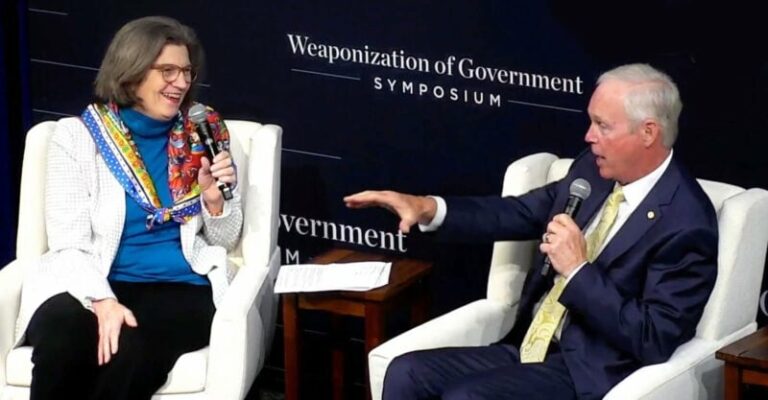New Instant Digital Payments System Isn’t a CBDC, Feds Say — But Critics Say It’s Still About Control
The Federal Reserve wants everyone to know that its new FedNow instant digital payments system, which it plans to roll out in July, is not a central bank digital currency (CBDC).
“The FedNow Service is neither a form of currency nor a step toward eliminating any form of payment, including cash,” the U.S. central banking system said in recently updated statement on its website.
Last week, the Cato Institute, Associated Press and Yahoo all followed with articles echoing the Fed’s position — FedNow is “not a central banking digital currency,” with the articles dedicated to “fact-checking” the assertion.
After reports about FedNow started circulating in November 2022, and after the Fed’s March announcement that the system would launch this summer, bankers, crypto experts and people concerned with personal financial autonomylashed out, arguing that the system is a step toward a CBDC, or at least toward government control over the financial system.
A CBDC is a government-backed digital currency issued by a central bank — a purely digital form of money, promoted as a tool that could make transactions easy between individuals, companies and the state.
But such centrally controlled digital money is also programmable. It could be set to expire at a given time, or restricted to particular kinds of spending — and all transactions would be trackable by the federal government.
The FedNow digital payments system is not a currency, like a CBDC, but it does make instant and trackable digital payments possible.
The Biden administration last March issued an executive order giving the “highest priority” to investigating a CBDC for the U.S.
Earlier this year, Fed Chair Jerome Powell told the House Financial Services Committee a decision on CBDCs hadn’t been made. But, he said, “We’ll have real-time payments in this country very, very soon.”
Some have speculated that FedNow’s ability to make real-time transactions is a way for the Fed to provide key benefits of a CBDC without actually creating one.
Fed Board of Governors member Michelle Bowman said so specifically last August: “FedNow addresses the issues that some have raised about the need for a CBDC.”
Former Congresswoman Tulsi Gabbard last week tweeted:
Gabbard said:
“It’s about them being able to keep track of everything we purchase, whether it is a stick of gum or an automobile or anything in-between. And so if they have all of this information and data, which they will in this system, then where does that lead?
“It gives them the power to decide, ‘Okay, well hey, we don’t want to allow you to purchase certain things, or we may deem it necessary to freeze your overall account’ …
“[They say] ‘This is for your own good, this is for your convenience, to make it easier for you to conduct transactions,’ when in fact they are giving themselves all of the power, taking it away from us.”
Gabbard’s comments exemplify common concerns about CBDCs. In an interview with Del Bigtree on “The Highwire,” Catherine Austin Fitts, founder and president of the Solari Report, said:
“There is a huge push to continue to make sure to preserve cash, not just in the U.S. but in Europe because an all-digital system gives, ultimately, the people who control the central banks and the banking system an ability to literally turn on and off your money if you don’t do exactly what they say, and exactly what they say includes taxation without representation, healthcare mandates and literally taking away your kids.”
In response to the latest outcry, the Fed — and the media — rushed to quell fears. The Fed’s update says that it “has not made a decision whether to issue a central bank digital currency” and would do so only if a law were passed.
But Balaji Srinivasan, former chief technology officer of the cryptocurrency exchange platform Coinbase, tweeted:
“Fednow is central bank digital control, even if it’s not technically central bank digital currency. …
“People are immunized against the term ‘central bank digital currency,’ but not all forms of increased ‘central bank digital control,’ and FedNow is certainly the latter.”
How FedNow empowers the Central Bank
FedNow is an electronic instant payment system that would allow banks and their users to send and receive instant electronic payments 24/7. It could supplant apps like Venmo or Cashapp, bank-based payment systems like RTP and Zelle, or cryptocurrencies.
It will “enable every participating financial institution, the smallest to the largest and from all corners of the country, to offer a modern instant payment solution,” according to Ken Mongomery, FedNow program executive. It will be available “any time of day, any day of the year.”
Rather than being programmable money, like a CBDC, FedNow is a “payment rail” — a platform or infrastructure through which instant payments can be made between payers and payees in dollars.
But the FedNow guide specifies that every payment that goes through the system will pass through a Fed-controlled server and must “comply with applicable controls,” set by the Fed, Srinivasan said.
The roadmap for FedNow specifies it will offer payments between people, but also between people and the government, “which means automatic debiting from your account and automatic stimulus,” Srinivasan said. “In other words, even more direct government control over your bank account.”
That’s concerning, he said, because “in July, that Fed will soon have the visibility and power to monkey with your bank account directly to freeze or drain your funds at will with ‘applicable controls’ and ‘consumer to government’ payments, rather than being impeded by the current antiquated banking tech stack.”
There is a technical difference between a CBDC and FedNow, Srinivasan said.
“However,” he wrote, “[FedNow] is what people *fear* when they talk about a CBDC. It’s central bank digital control, even if it’s not central bank digital currency. And it’s a major step towards rolling out a full CBDC.”
“So I agree that the distinction between FedNow and a CBDC is important from a technical standpoint, but not from a civil liberties standpoint,” he wrote.
Fitts, who strongly advocates people use cash and a financial system that combines “healthy” analog and “healthy” digital technologies, told Bigtree the danger of a fully digital system “is that it can be centrally controlled.”
She agreed the problem societies are facing is not a narrow, technical question of CBDCs. “The challenge for all of this is how are we going to absolutely prevent the central bankers from instituting complete financial controls,” she said, adding:
“Whether they do it through their payment systems, whether they do it through CBDCs … It’s only a few steps until they have complete central control. So this is what needs to be prevented and it’s going to take the citizens and the state legislators to help us do it.”
Centralized control is a move towards ‘complete and utter tyranny’
The Fed announced the launch of FedNow on March 11, in the midst of the banking crisis that took down Silicon Valley Bank, Signature Bank and Silvergate, which had some of the biggest stakes among banks in the nation in the cryptocurrency industry.
“It looked to me like a game of economic or political warfare, or both,” Fitts told The Defender.
Many in the world of crypto argue these banks were taken down because of their cryptocurrency holdings — because cryptocurrency offers an alternative to a centrally controlled system.
Some experts observed that the banks that failed played a key role in providing cryptocurrency transactions that could compete with the Fed’s proposed payments system.
Signature bank’s Signet network and Silvergate’s SEN (Silvergate Exhange Network) allowed cryptocurrency firmsto settle payments 24/7/365.
“That’s kind of a CBDC, but being run privately, and so if you are going to actually try to roll out a CBDC run by the Fed, you can’t have a functioning competitor that’s not in their control,” financial analyst and creator of Liberty Blitzkrieg, Michael Krieger, told investigative journalist Whitney Webb in an interview on her Unlimited Hangout podcast.
Closing those banks also hurt cryptocurrency in other ways. Because blockchain runs all of the time, relying on legacy banks that are not open on weekends, this causes liquidity problems for cryptocurrency, Nick Carter, cryptocurrency expert wrote on his Substack, Pirate Wires.
Carter detailed how the takedown of these banks fits into a broader program by the Biden administration, the Fed and big banks to dismantle the crypto industry that offers an alternative to the banking industry they control.
In two posts on Pirate Wires, Carter outlined how the administration strong-armed banks into closing their doors to crypto firms over the last several months — or in the case of SVB, Signature and Silvergate, closing the banks that serviced crypto — risking the stability of the global economy in the process.
Former U.S. Rep. Barney Frank shared this hypothesis. So did the Wall Street Journal’s editorial board, which wrote two op-eds arguing that the bank closures were motivated by regulators’ hostility toward crypto.
The outcome, he wrote, is that bankers that service crypto clients are in an atmosphere of “abject terror,” worried they easily could be shut down or seized.
“Most worryingly, the takedowns of Silvergate and Signature represent a rank lawlessness associated with authoritarian regimes,” he said, adding, “In a lawful society, solvent banks are not seized by the government simply because their clientele is politically disfavored”
Fitts said there is a broader issue at stake in the current banking crisis.
“We have a society that is destroying wealth rather than building it and it is destroying productivity,” she said. “In the process it is centralizing control and it is moving to complete and utter tyranny.”
“If we refuse to comply now and we fight for financial transaction freedom now, if we work with our state legislators to fight for financial transaction freedom now, whatever happens, it’s better than what happens if we go along,” she said.
Originally published by The Defender
Suggest a correction







